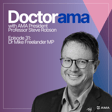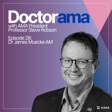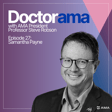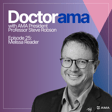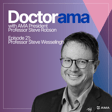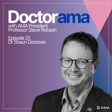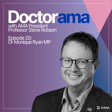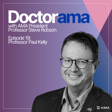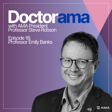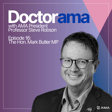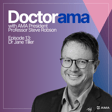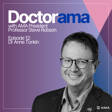Become a Creator today!Start creating today - Share your story with the world!
Start for free
00:00:00
00:00:01

Episode 11 - A/Prof Louise Stone
In episode 10 of Doctorama AMA President Professor Steve Robson chats with A/Prof Louise Stone.
Recommended
Transcript
Prevalence of Sexual Harassment in Medicine
00:00:00
Speaker
The data suggests that almost one third of female doctors in Australia have been subject to incidents of sexual harassment and the victims of that harassment tell us that overwhelmingly the perpetrators are their own colleagues. These are shocking things to hear and today we're going to meet someone who's determined to do something about this situation on Dr Rama.
00:00:26
Speaker
You're listening to Dr Rama with Steve Robson, bringing you the best of health, medicine and people.
Introducing Dr. Louise Stone
00:00:35
Speaker
My guest today on Dr Rama is associate professor Louise Stone, who is herself the GP swamp warrior. Welcome Louise. Welcome. It's good to be here. I'm going to come back to how you gave yourself that Twitter handle a little bit later on. But welcome. And you're an early bird because we're recording this very early in the morning.
00:00:54
Speaker
Oh yes, yes. Is this the habit of a lifetime? You're always an early person. Absolutely. One of the things I learned doing rural obstetrics as a GP is that nobody rings you at four o'clock in the morning. So if I need to get any admin done, it always gets done extremely early.
00:01:11
Speaker
Well, look, I've managed to drag myself out of bed to do the podcast recording with you this morning. Louise, I'd like to start by just finding out a little bit about your journey into general practice, because I know that you did your initial training in Sydney, but you've got qualifications from Melbourne, from Wollongong, from all over the place.
Dr. Stone's Career and Diverse Experience
00:01:34
Speaker
Tell me a little bit about your journey.
00:01:36
Speaker
Yeah, it's interesting, isn't it? I think some people actually plan things. For me, it's always been about serendipity. So I did a degree in medicine, but I did psychology at night, which is stupid, but you do these things when you're young.
00:01:49
Speaker
And then I was determined to get as far away from Sydney as possible, to be honest, so I went from there to Broken Hill. And then down to Gippsland, where I had a wonderful 10 years as a rural obstetrician and as the only female doctor within three hours. And as you can imagine, I got swamped with trauma. I started leading the Masters of GP Psychiatry for Melbourne and Monash. Melbourne and Monash were doing some wonderful things back then that were quite unique.
00:02:17
Speaker
And then about 10 years in, I had my third daughter who needed tertiary hospital care and I ended up back in Sydney. And somewhere in there, I did a PhD looking at medically unexplained symptoms and then finally ended up in Canberra. So I've been all over the place. I think the thread that probably runs through is that I've always worked
00:02:37
Speaker
in mental health in complex mental health in general practice and as you know in general practice mental health care is extremely diverse and extremely deep so i've had the privilege of teaching mental health in a number of master's programs but also just as courses in acrum and college and various other organizations of my career.
00:02:58
Speaker
Louise, going through your CV, it's incredibly like chock-a-block first of all with a PhD and all of the things you've done. How have you managed to fit all of that in and work as a busy GP through the time?
Balancing Multiple Roles to Avoid Burnout
00:03:13
Speaker
I can't get my head around how you've fitted it all in.
00:03:15
Speaker
Look, I learned really early in my career, I think after my residency, that I don't do well if I do more than two and a half days in clinical practice. And I think that's probably because of the complexity of the patients. I remember getting very frustrated with a supervisor who came in to watch my clinical practice. And at the time, I think I was pregnant and I was running a women's health service and trying to do all sorts of things.
00:03:39
Speaker
She said I had a time management problem. I remember looking at her and saying, I don't have a time management problem. I have a complexity allocation problem.
00:03:50
Speaker
So I realized early on that if I did that full time, I just burned out. So I've always had a second job where I've done policy or teaching or research or something that enables me to get up on the high ground and look down, because if I don't do that, I drown in the complexity of general practice. And as you know, it's also become less and less financially viable for
00:04:13
Speaker
women like me in general practice who work in complex care because of the way that Medicare is structured. So it's also most of us have a second job to try and subsidise
Systemic Problems in General Practice
00:04:22
Speaker
our income. It's interesting you use the phrase high ground there because your Twitter handle is the GP swamp warrior that suggests you're kind of down. Do you think it is a war? Are you a warrior at the moment?
00:04:37
Speaker
Oh, yeah. So that comes from a guy called Donald Sean. He says it doesn't matter what profession we're in. And he wasn't referring to doctors. He's an educator. That there's always a high ground overlooking a swamp and up on the high ground you have
00:04:52
Speaker
straightforward problems that lend themselves to technical solutions. But it's down in the swamp where the problems are of greatest human concern. And I guess I've always found my place as a generalist down in the swamp. And I've written a series of Medical Republic about that. But for me, it's always been that. The last three years, I've done a lot of writing. And the reason is that it saddens me so much that I'm seeing so many young GPs leave the profession.
00:05:20
Speaker
They feel it's because they've done something wrong that they've failed, that they've been unable to manage the systemic barriers they face. It's been incredibly important for someone senior in the profession like me to say it's a systemic problem because they feel
00:05:38
Speaker
I think that phrase is not a time management problem, it's a complexity allocation problem is a very similar idea that the way that Medicare is structured, it's actually impossible to do the sort of general practice that we want to do and that our patients deserve within the current structure.
00:05:57
Speaker
Louise, when I was a medical student, and it's quite embarrassing, this was back in the early 80s, general practice seemed at that time to be thriving. And my general practice rotation, it was a wonderful atmosphere and everybody really felt that they were doing a great job contributing to the community. And of course, that's still what general practice is doing. But people just don't seem to feel like they're doing that anymore. Is that your sense? Has there been a change in the way GPs
00:06:26
Speaker
feel about themselves, and is it something to do with the perception of how they're valued? We know that moral distress, that idea of being unable to do what you're trained to do because of structures outside your control, is directly proportional to a gap.
Moral Distress in Healthcare
00:06:45
Speaker
And the gap is between what people say and what people do. So in hospitals, what we know is that if you have
00:06:55
Speaker
policies and values that assert one thing, that behaviour that asserts something else, the moral distress goes up. So for instance, one of our local hospitals has a value statement that says, we respect everyone, we treat everyone the same. When in reality, it's got the worst bullying and harassment problems in the country, right?
00:07:14
Speaker
So it's unsurprising there's moral distress in general practice over the pandemic that moral distress has become extreme because while on the one hand we're being told where the cornerstone of the health service on the other we're being bankrupted and at the same time
00:07:32
Speaker
We are finding that the community, the media, the Margaret Faux debacle last year, several other things. I remember there were a series of unfortunate events, is what I called them, where general practitioners realized that the rhetoric we were being given about the importance of general practice wasn't held true. So for instance, we weren't in the first round of vaccination.
00:07:58
Speaker
because we weren't considered frontline workers, which was bizarre. But it was also this astonishment that really that was the way our profession was held, the esteem in which we were held by the government of the time. And so there were a number of those. I remember the bizarre Christmas Eve, the government
00:08:20
Speaker
had a habit of announcing changes in the media rather than to us. And on Christmas Eve, when we generally have skeleton staff, they announced another layer of vaccination. So all our receptionists were absolutely swamped by these calls on Christmas Eve.
00:08:37
Speaker
to book in for vaccines, which of course we couldn't do. So there is a number of reasons why we realised that the rhetoric no longer matched the pattern. And we're seeing it again now with this triple incentive billing and everyone thinks we're getting
00:08:51
Speaker
of course, triple income, when in reality, it's actually triple a very small incentive. And many people don't realize, for instance, and this is the female, the lady doctor, what I call the lady doctor problem, the lady doctor problem. And the reason that we have a 30% gender pay gap is that women do most of the complex care. And I don't know whether people know this, but that triple incentive has excluded mental health and antenatal care item numbers.
00:09:19
Speaker
which are the most poorly paid item numbers in the system. So what that works out to be is that if I spend an hour with an adolescent sleeping in their car, and I do quite a bit of that because I've got those mental health skills, it's $50 take home before tax, which is utterly unsustainable, especially when I also am a contractor, so I have no leave, no
00:09:46
Speaker
no other entitlements. So it's becoming utterly unsustainable and it's that disrespect and moral distress. And if I could say one more thing, the other thing that drives us crazy is that on the one hand, we're celebrated publicly for being good at what we do. On the other hand, there are administrative requirements. I can no longer order an MRI from the brain for someone I think has MS.
00:10:13
Speaker
can no longer order an MRI for a traumatic brain injury in Veterans Affairs. And I can't even make a diagnosis on a disability support pension form without my patient seeing an inverted commas specialist. So that disrespect is so systemic that it not only drives us crazy, it impedes care and
00:10:37
Speaker
It illustrates to us the esteem in which we're held, which is lowering, and that's why we're going to be in 11,500 full-time equivalent GP short by 2030.
Organizing the Sexual Harassment Summit
00:10:48
Speaker
Louise, recently you and I spent a day together, although you did all the work.
00:10:53
Speaker
and the summit that you held on sexual harassment in medicine. And it was an extraordinary day, an extraordinary room full of committed people. But I'd really like to understand how you got to that point, what got you involved and determined, I guess, to help in the first place. And talk me through how we got to the point where you're able to gather such an extraordinary group of people
00:11:21
Speaker
at Old Parliament House to deal with the issue. So in 2014, I looked after an intern who was sexually assaulted by her boss while on the way to a car park after a night shift. And I do a lot of mental health work, as I've said before, but this consultation was the hardest I've ever done. And when I was reflecting on it afterwards, I was thinking, well, she's a doctor. I'm a doctor. He's a doctor.
00:11:46
Speaker
It makes sense that there's complexities in that therapeutic relationship. I went looking for literature and there really was only a little bit of light information about potential prevalence and so on, and nothing really about how we care for people like this. I guess that led to a research project where I interviewed survivors.
00:12:09
Speaker
And it struck me that there were some things about medicine that made medicine a little different to other settings where I've managed survivors. Of course, we're in a hierarchy, but so are the military and so is law and a number of other professions.
00:12:24
Speaker
But there's something about we live in, we stand in close proximity. I guess as an obstetrician, you would be a gynecologist. You'd be very aware that we all cluster quite closely in accident and emergency and in theater. We also spend ridiculous hours. And so the people we socialize with are often the people we work with. And also, I think there's something about the way we teach registrars and students
00:12:54
Speaker
to bury trauma and get on with it. We wouldn't survive in medicine if we couldn't put the awful things we see to the back and get on with what's in front of us. And unfortunately I think when it's our own trauma we do the same.
00:13:09
Speaker
And I think that that made me realise that medicine had a few things in it that needed to be explored. So I did this qualitative study and when I was disseminating it around the world, I realised that it's happening everywhere.
00:13:27
Speaker
people from Egypt, people from Argentina would come up to me and tell me about their experience. And so I put together, in the end, I decided, typical GP, somebody needs to write a book. And so I went, well, I guess that's me then having no experience or expertise in that area at all. Gathered all these authors together. They all disappeared during COVID to do what they did. So we gathered them again.
00:13:49
Speaker
and hopefully that book's coming out late next year. But all the experience that I had from talking to these people around the world and learning about their expertise, I thought it was good to bring Australian experts. So I went out to... I really did it, I suppose, the way that I prefer to do things, which is to lead from the middle. And so I wrote to everyone individually and just said,
00:14:15
Speaker
this is important. Here's what prevalence statistics we have, even though they're not great. And I'm bringing this together. We had no money. We had no
00:14:28
Speaker
We really had no backing institutionally, although ANU was very helpful in the administration of the summit. But I think it was just its time. And so people realised that the colleges, the hospitals, the universities, the medical boards, the medical defence organisations all realised that we have a problem. And we brought people together from Australia and New Zealand and the UK.
00:14:53
Speaker
put diversity targets in there because I feel very strongly if we don't look at this from a diverse lens, we will never understand because the more diversity in the mix, the greater the risk for our young doctors. And so people for some reason had some faith that we were going to make a difference and we all came together. And I think part of it too was managing this in a trauma informed way, which meant
00:15:22
Speaker
being extremely careful about how it was set up and making sure that a lot of the things that could have been triggering like lived experience narratives were given before the summit so that people could approach them in their own way, in their own time, and realise that during the summit we would steer off things that were likely to be too confronting and focus on policy. And I think that was a good decision. I think I would do that again in retrospect.
00:15:51
Speaker
There was, I guess, two points. If you look at the prevalence, that's very clear from the work that you've done. Looking around the room we're in that day, there must have been people who had been sexually harassed, potentially sexually assaulted in that room. Was that on your mind?
00:16:09
Speaker
Oh, absolutely.
Planning the Summit - Considerations and Challenges
00:16:11
Speaker
We actually emailed out the workshop groups to everybody and I gave a very generic statement that said something like, if there's someone in the group with whom you would not feel comfortable speaking openly, please let me know and I will move you. I also knew there were perpetrators in the room.
00:16:28
Speaker
in that people had let me know. I didn't know who they were. It wasn't important. But I did know that I had to be careful around that. And I was very careful to do what qualitative researchers call bracketing. So at the beginning of the summit, one of the things we did was to say
00:16:45
Speaker
We're not going to be bickering about prevalence because everyone measures it differently over a different period of time with different parameters. We can avoid the issue by bickering about prevalence, so we bracketed that out. We also used a case that wasn't at the edges, that was right in the middle so that we didn't bicker about, well, she's wearing a low top or a short skirt and what do you expect. I wanted to avoid that.
00:17:11
Speaker
conversation about edges and say we have a typical case that fits the policies that should get through and doesn't, why not? I think those parts of the equation were important. I was also fortunate enough through my GP training, I ran GP training as the Senior Medical Advisor for 10 years and one of the things that I was fortunate enough to have is awesome facilitators who in general practice we have facilitators who
00:17:41
Speaker
As you can imagine, we have to do a lot of work in things like palliative care, things like death and dying, all sorts of things that are quite confronting. And so there are some extraordinary educators and I had a lot of them in the room.
00:17:54
Speaker
doing some really intensive, difficult facilitation work. I was very fortunate to know that the workshop participants were in safe hands. I also did this thing where I brought the students in the night before for dinner at a very unthreatening co-op where we did a mentorship dinner and we had a play with some interpersonal challenges that you have in leadership.
00:18:18
Speaker
And I must say when I was watching these seniors scrape the remainders of their lentils stew into a bucket, I thought it was a very levelling experience for students and it certainly made them feel a lot more, I suppose, able to participate in such a high level meeting because otherwise I think they would have been quite intimidated.
00:18:36
Speaker
Louise, the other aspect of this is that with the levels of prevalence that are absolutely clear, you must have had colleagues who were perpetrators over the years.
Addressing Perpetrators and HR Limitations
00:18:48
Speaker
Has this happened and how do you deal with that personally? It's very difficult, isn't it? I must say that a lot of people have asked me whether I've been a survivor myself and the answer is actually no.
00:19:00
Speaker
have not had that experience. I was extremely fortunate for most of my GP training to have, I think, the best GP supervisors in the country. They were amazing. As the only woman in that group, I've always held those doctors in huge respect. I also had two rural obstetricians who were male who taught me who were amazing. I've actually been extremely fortunate
00:19:26
Speaker
I think what I have seen in terms of management, and I discussed this with the UK team. So I've worked a lot with people in the UK because they, of course, have had a lot of public cases, including the recent paper on the surgeon. Which was horrifying. Which was horrifying, yes. And although I should say at this point, although we know that most of the perpetrators are men, most of the victims
00:19:52
Speaker
Maybe women, but there are a lot of victims who are not so many survivors of all genders. And I think I'm not hearing from men and from gender diverse people because the barriers to speaking up are so much higher. So although I've interviewed women, I didn't seek to interview women. It was just women who were ready to come forward. And I actually understand that as a man, that would be extremely difficult.
00:20:19
Speaker
but I'm looking at trying to widen that gap. In terms of perpetrators, what we think is that the biggest intervention seems to be someone at the same level talking to them. And I put out a call to the anaesthetists at this point because it's often been the anaesthetists who've called out the surgeons.
00:20:39
Speaker
And not that surgeons necessarily have the highest prevalence. We actually don't know that yet. But I have heard of several cases of whistleblowers being anesthetists. I think it is necessary to have someone at that level. One of the things I would like to eradicate is what one of my young colleagues who's working on this project with me calls the cup of coffee with Brian problem where someone reports to human resources and they say, well, why don't we just go out for a cup of coffee and we'll
00:21:07
Speaker
sorted out informally, which of course is nonsense when you're an intern and he's the senior surgeon or the senior physician.
00:21:15
Speaker
It's just not an even playing field and it makes that young doctor extremely vulnerable. So I think we do have to think about what we do in the human resources space and question what human resources can actually do, given that they work for the organization, not necessarily for the individual. And I think that's a tricky space.
00:21:37
Speaker
Absolutely. I've been a former college president and dealing with this is the devil's own job because often you don't have any HR power at all from a college perspective. Louise, this has been fascinating. We're coming to time. There's so much more that I want to talk about here and I suspect you'd be open for another chat.
00:21:56
Speaker
What i'd like to talk about sometime in the new year if i can if i can pin you down again in the early morning before the dawn breaks is some to talk about ways forward and clearly a lot of material came out of the summit and there will be a lot that i hope you like to share.
00:22:12
Speaker
with listeners, I want to thank you so much. You've done so many amazing things over so many years for the profession. It's really hard for me to even grasp everything you've done, but I think on behalf of all your colleagues too, I guess I should thank you for everything you've done and for spending some time talking with me this morning.
00:22:32
Speaker
Yeah, thanks. I love my profession. I love this field. I love general practice. And I think we're in such a wonderful position. And I've had the good fortune to work with extraordinary colleagues. So I'm extremely grateful for the chance I've had in my life to do what I do. So thank you very much. It's a real pleasure. Thanks for joining me this morning on Dr. Ryan.
00:23:03
Speaker
You've been listening to Dr Rama, a podcast produced on Ngunnawal country by the Australian Medical Association. All rights reserved.
